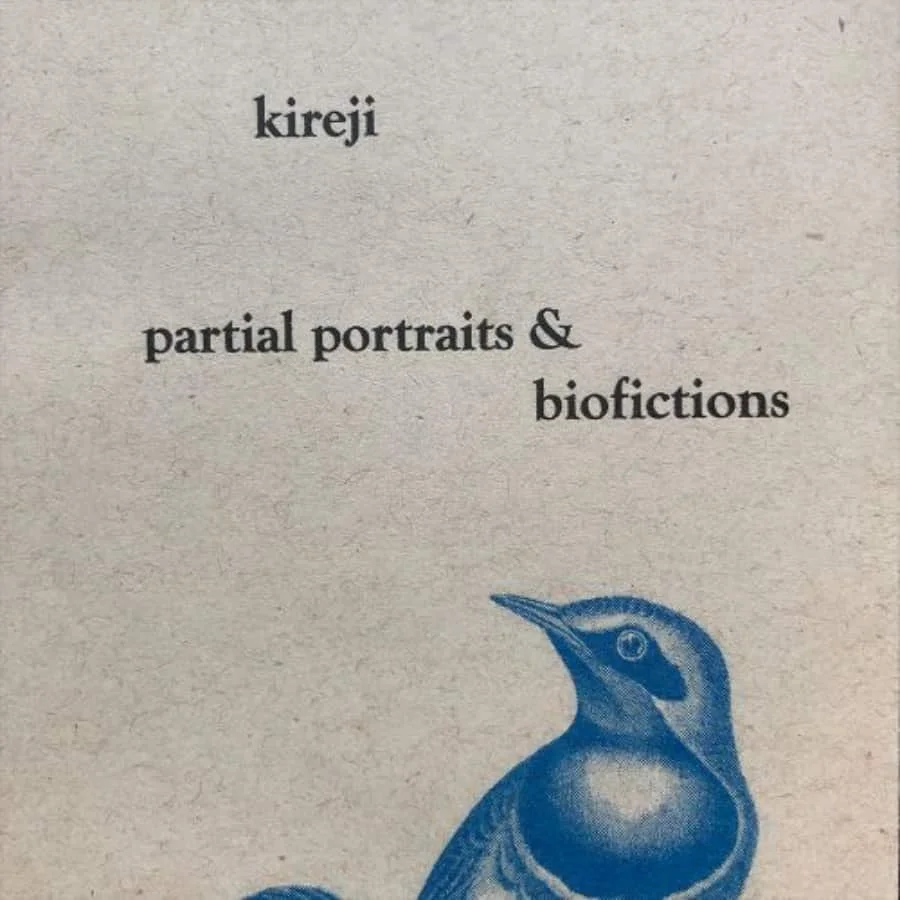Book: kireji: partial portraits & biofictions
by christian favreau
Published by JackPine Press
Review by Shelley A. Leedahl
$30.00 ISBN 9781927035436
I have a special interest in reviewing “first” books, in part because it’s been thirty-one years since my own first book was published, and though I’ve followed up with another dozen titles, I still meet folks who claim they liked my first book best.
Today I read Montreal writer christian favreau’s first book. Kireji: partial portraits & biofictions is an attractive, hand-sewn chapbook with a cover image of a bird. The book contains nine free verse poems, a business card-sized note to “Please be gentle while handling,” and four actual leaves. Leaves? Now that’s a new one for me, but JackPine Press is all about originality, and favreau’s work definitely fits the press’s mandate to “publish chapbooks whose form and content are both artistically integrated and unique”.
What did I find? Firstly, like fellow Canadian poet bpNichol—whom favreau quotes in the opening poem, which is comprised solely of three epigraphs—this new poet also sometimes eschews punctuation. In his second poem, “the finch,” he writes “Id dreamt/Id screamed/all the while unheard,” and he includes a measure of treble clef notes, perhaps to emulate the finch’s song. The poem concerns “relying only on one/self” and how “cutting out the others is an act of self/preservation”.
Family and how one makes their original way in the world seem to be themes: “I learn to refuse to fly/in linear fashion/to flit while you blink” he writes in “to my parents”. In this poem two of the poet’s subjects of interest merge: birds and independence. “I must fight the urge:/ to fall—/needing you/not to chew my food”. I loved “the blue sky’s enticing fishhook” in this inquisitive poem that asks “what is?/how can?” and “why that?/ why not?”.
I’m intrigued and delighted by the creative use of colour in these pieces. We read about “the snow-petaled whites between her lids” and “red azaleas bloomed in the cracks of my lips” in the long poem “me (first) / river of forgetfulness”. This is an environmental poem, with numerous references to nature, place (“stawamus and its rock-formed apron”), climate change (“unpredictable rainfall” and “oh, the heat/rises two degrees”), and the part humans play in the planet’s destruction (“blackbird, lift your frequency/drown the sound of spade/on rock”). The focus on the environment’s a natural fit for favreau, who is a climate justice organizer as well as a writer.
While reading this thoughtful, introspective book, I turned to Wikipedia to learn what kireji means: “kireji (lit. "cutting word") are a special category of words used in certain types of Japanese traditional poetry [like Haiku]… … Used in the middle of a verse, [kireji] briefly cuts the stream of thought, indicating that the verse consists of two thoughts half independent of each other”.
Finally, what’s a first book without a love poem or two? The poet writes “we were singing/the same aria/I like to think” but on the same page we find this tender and “just right” image concerning loss: “a hand on a wrist/holding gently/letting go”.
THIS BOOK IS AVAILABLE AT YOUR LOCAL BOOKSTORE OR FROM THE SASKATCHEWAN PUBLISHERS GROUP WWW.SKBOOKS.COM

